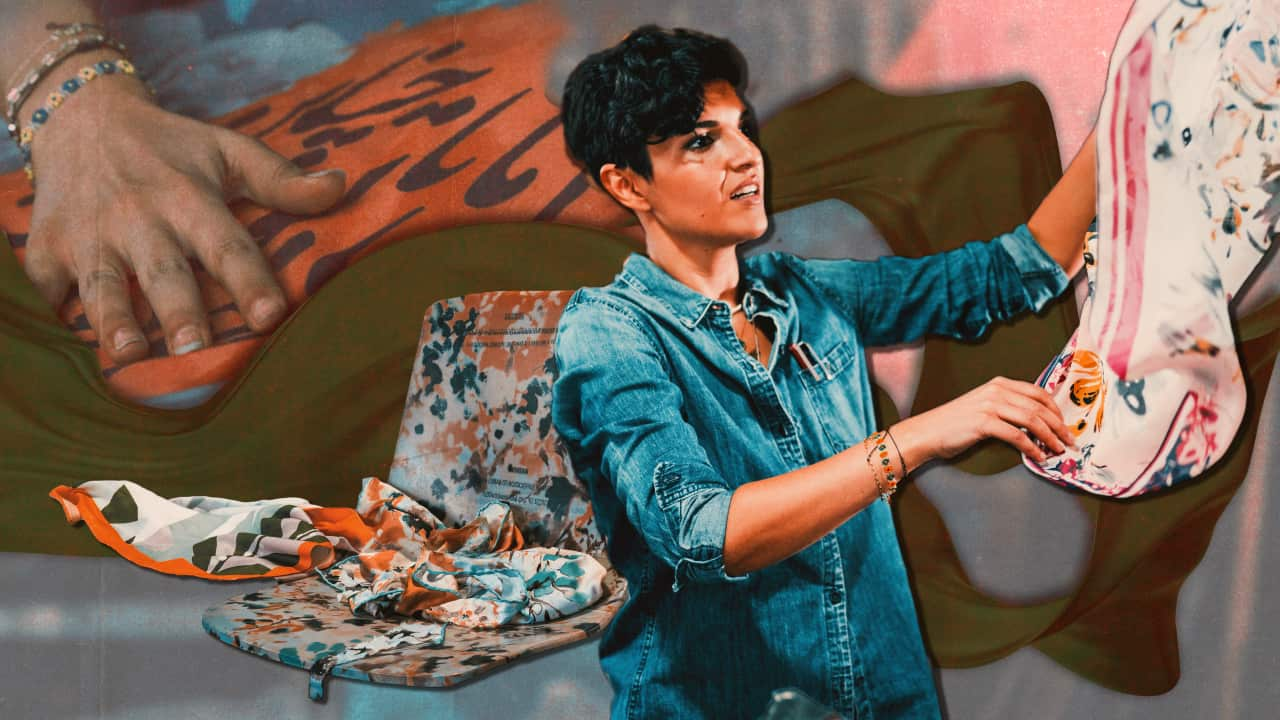Key Points
- Nila Rezaei’s ‘Crafted Liberation’ project repurposes donated headscarves into stadium seats.
- This project aims to raise awareness of the ongoing struggle for women’s rights in Iran and inspire global solidarity.
- The hijab has been used by the Iranian government as a tool to control women’s bodies and restrict their freedoms.
“I felt guilty for not being In Iran when the ‘Woman, Life, Freedom’ movement happened,” she told SBS Persian.
‘A sense of guilt’
She was a woman from Iran’s Kurdish minority arrested by the so-called morality police for allegedly not observing the country’s mandatory hijab laws.
This project was a form of therapy for me.
Nila Rezaei
After putting a call out for donations, Rezaei and her company RK Collective set to work with the help of a team of specialised textile waste manufacturers to create sports stadium seats using the headscarves.

Nila Rezaei and Christopher Krainer, founders of RK Collective. Credit: Alex Smith
The headscarf, a symbol of oppression in Iran, has been reclaimed by some women as a tool of defiance.
Similarly, the stadium has traditionally been off-limits to women. Recently, Iranian authorities have claimed that women can now attend sporting events at stadiums, but in reality, significant restrictions remain in place.
“Without the contributions of each individual, this project would not have been possible.”

Women tossing headscarves in a shoot for Nila Rezaei’s art project. Credit: Debbie Gallulo
Having experienced the forced dress code as a teenager in Iran, she said she empathised deeply with the struggles of her fellow women.
The exhibition, dubbed “Crafted Liberation”, launched in November and runs until 19 February, 2025, at the Australian Design Centre in Sydney.
Symbol of the ‘government’s control over women’s bodies’
“The hijab, and specifically the scarf, is the symbol of the Islamic government of Iran. It is extremely important to them,” Davachi said.
The hijab symbolises the government’s control over women’s bodies.
Azadeh Davachi
“The Iranian government’s approval of such a strict bill, amidst the country’s ongoing struggles, demonstrates their unwavering commitment to maintaining the hijab mandate,” Davachi said.

Azadeh Davachi. Credit: Supplied
Following this bill, the Iranian state announced plans to open a “treatment clinic” for women who violate the mandatory hijab laws.
While there hasn’t been a significant change toward more freedom in Iran’s laws, Davachi noted a gradual shift in attitudes, particularly within families, against the mandatory hijab.
The ‘Woman, Life, Freedom’ movement, sparked by Mahsa Jina Amini’s tragic death, was not an overnight event.
Azadeh Davachi, researcher, writer and women’s rights activist
“It was a culmination of years of underlying resistance and a growing desire for change within Iranian society.”
Installing the seats in Iran
“I hope that non-Iranians will feel comfortable discussing these issues, even if they haven’t experienced them firsthand,” she said.
“Imagine if women from a specific city could send us their scarves, and we could turn them into seats that they could then install in their local community,” Rezaei suggested.

Stadium seats created for “Crafted Liberation”. Credit: Debbie Gallulo
“These seats would become gathering places where people could come together to discuss the stories of Iranian women.”
“I dream of seeing these seats installed in Azadi Stadium in Tehran, but I know that may not happen in my lifetime,” she said.
